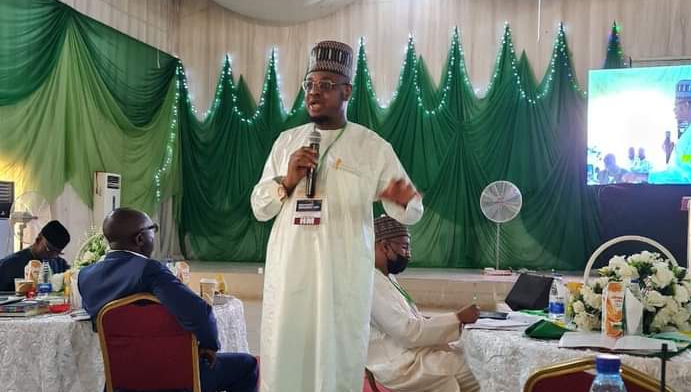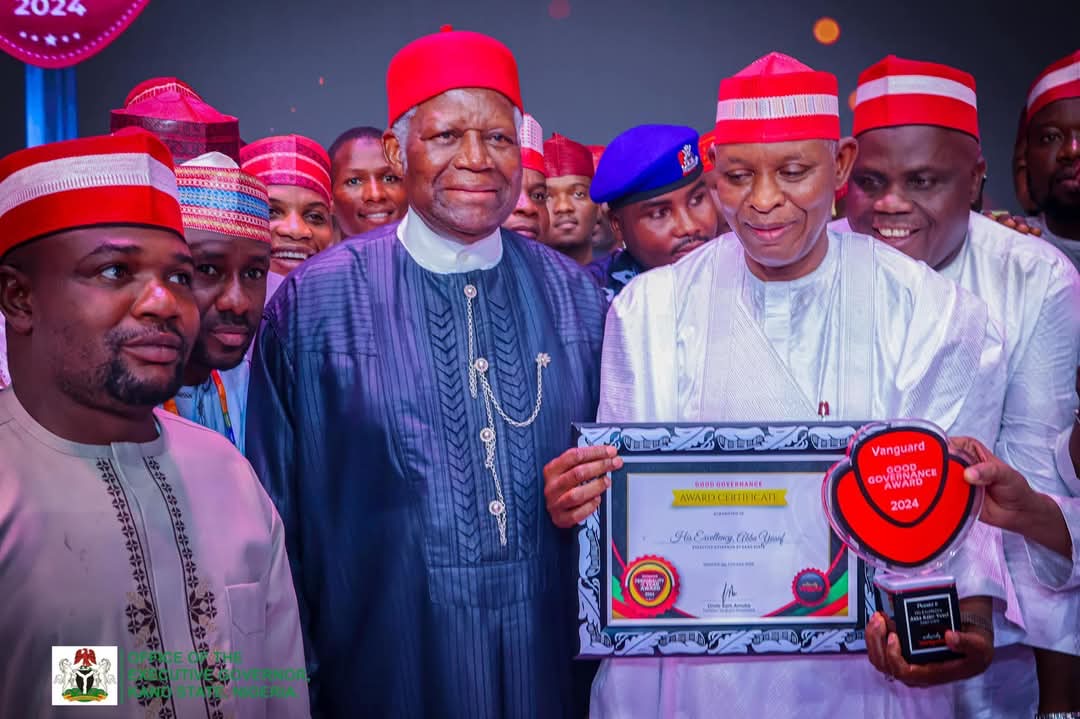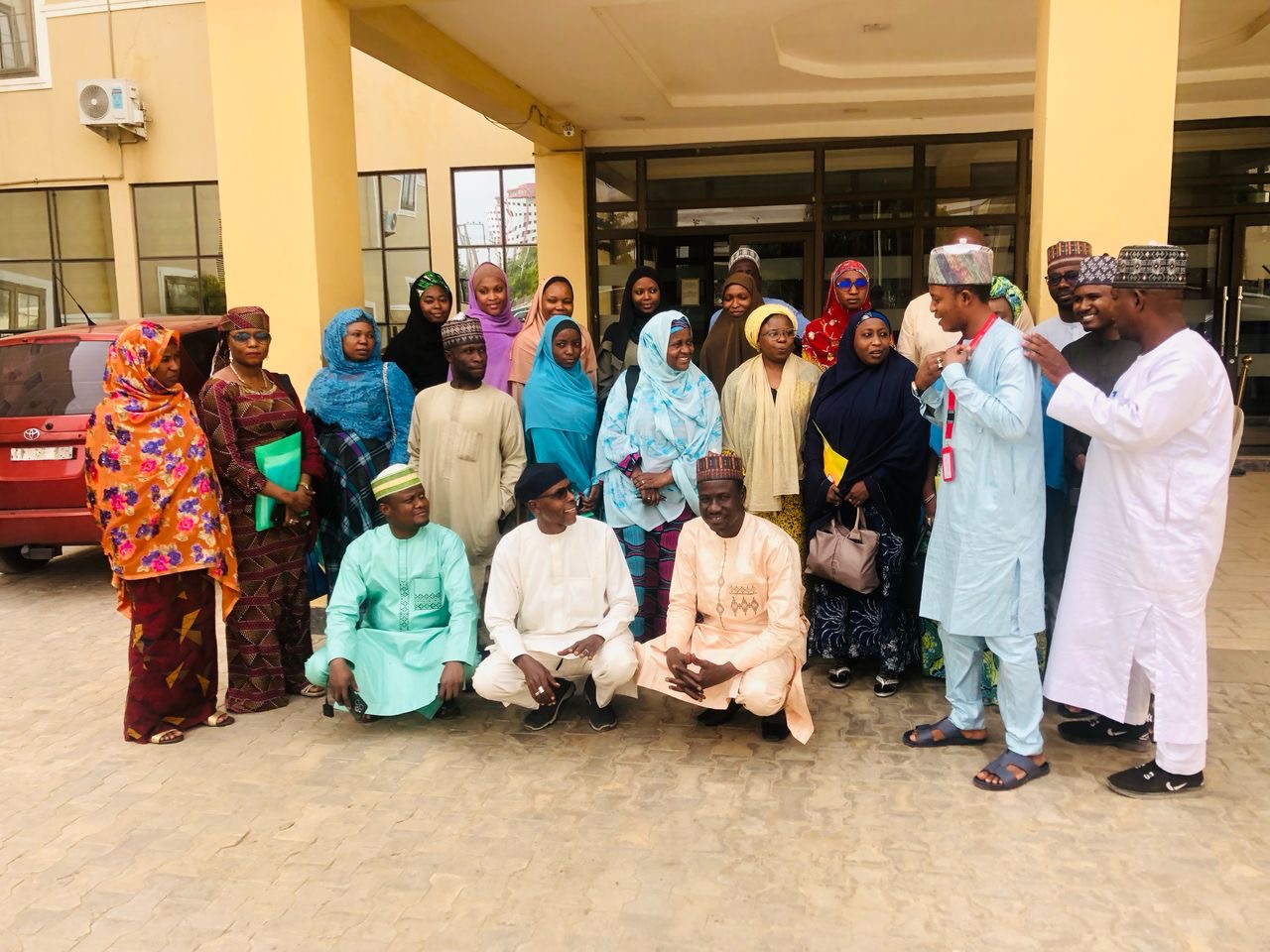News
Pantami Commends Agencies in the Communications Sector

Nasiru Yusuf
The Minister of Communications and Digital Economy, Prof. Isa Ali Ibrahim (Pantami), has commended all the agencies in the communications and digital economy sector for being dedicated to the implementation of the National Digital Economy Policy and Strategy (NDEPS) 2020-2030, and urged them to work collaboratively and co-ordinately in order to achieve the Federal Government’s strategic objectives as articulated in NDEPS.
KANO FOCUS reportsthat Pantami stated this at a retreat organised by Federal Ministry of Communications and Digital Economy (FMoCDE) for senior management staff of the Ministry and all its agencies which commenced on March 31, 2022.
The retreat was convened to evaluate the implementation of NDEPS in the context of what has been achieved, what needs to be achieved, and what processes should be emplaced to enhance the capacity of the Ministry and Agencies it superintends to mobilise all stakeholders to accomplish the objectives of NDEPS.

The retreat took place at the Nigerian Army Officers Wives’ Association (NAOWA) Centre at Mambilla Barracks, Abuja.
Citing the most recent report of the World Economic Forum (WEF), the Minister in his keynote and opening address told the forum that synergy among stakeholders in terms of co-operative posture, collaboration, coordination, deployment of social skills such as good listening skills, critical and analytical thinking, emotional intelligence, as well as project management and quality assurance skills, are central to organisational effectiveness, successes and the future of work, as projected by WEF.
Pantami then urged all the agencies and their staff to challenge themselves to do more rather than think of themselves as competitors.
Also speaking at the retreat, the Executive Vice Chairman and Chief Executive Officer (EVC/CEO) of the Nigerian Communications Commission (NCC), Prof. Umar Danbatta asserted that the NCC has acted superlatively in implementing NDEPS and in the context of the vision of Federal Government and the supervision of the Ministry.
Danbatta who made clearly methodical presentation that chronologically documented NCC accomplishments under each of the eight (8) pillars of NDEPS, cited 10 of the 16 regulations that have been instituted in giving expression to Governments vision on developmental regulation, which is the first pillar of NDEPS.
These regulations were focused on Enforcement Processes, Lawful Interception, Quality of Service, Competition Practices, Licensing Regulations, and Universal Access and Universal Service among others.
Danbatta promised to also complete the review of the remaining soonest and activate their implementation. Danbatta, who used a triangulation method in contextualising the achievement of NCC under the first pillar, itemised the guidelines, regulations and policy development initiatives to discharge the burden of proof of NCC’s effectiveness in the regulation of ICT and digital economy sector through approaches that enabled development.
In implementing Digital Literacy and Skills, the second pillar, Danbatta also stated in his clearly explanatory presentation, that the Digital Bridge Institute (DBI), set up by NCC in 2004, had trained 5,352 students through 49 institutions, provided educational training software to 398 secondary schools, and endowed 7 professorial chairs in various Nigerian universities across all the geopolitical zones.
On Solid Infrastructure, the third pillar of NDEPS, Danbatta stated that broadband penetration as at December 2021 was 40.88 percent, thus enabling 80 million Nigerians to have access to broadband services.
To reinforce the intensity of NCC’s commitment to improving broadband penetration, the EVC declared to the forum that NCC has emplaced a process for the deployment of optic fibre cable using Infrastructure Companies (Infracos).
Danbatta was emphatic that the licensed Infracos have been directed by the Commission to commence immediate roll out without recourse to counterpart funding because the licence issued to them is independent of the counterpart funding agreement.
The Infracos are expected to lay 38,296Km of fibre optic cable. Also, in keeping with Government’s directive through a Federal Executive Council decision of 2005, NCC has constructed 32 Emergency Communication Centres (EECs) in various states, and 32 of those have been activated and are operational.
Prof. Danbatta also documented copiously in his presentation, Commission’s achievement in the other five pillar areas.
Dr. Armstrong Takang, an innovative and technology-for-development specialist, who presented the lead paper as guest speaker, praised the Federal Government for concretely aligning ICT, and digital economy with national economic imperatives.
Additionally, he commended NCC for driving the necessary infrastructure purposely and strategically, and for its effectiveness in regulating the telecom sector.
Takang, citing Lagos State and the Federal Capital Territory Administration as good models, Takang emphasised the correlates of adoption of technology or automation in economic growth and effective governance, crediting technology for improved internally-generated revenue in Lagos State.
Takang recommended that Nigeria must link technology to specific programmes that are impacting and sustainable. He also asserted that Nigeria needs to undertake pilots for projects that are planned for implementation and utilise the results of the pilots to scale up and for budgeting.
Takang also bemoaned the human capital challenge in the ICT sector in Nigeria, insisting that at least 500,000 software engineers are required to redirect efforts for effectiveness of policy.
The Director overseeing the Office of the Permanent Secretary in FMoCDE, Engr. Abubakar Ladan, and the following CEOs of the other agencies in the Ministry also made presentations on their efforts and activities towards accomplishing the objectives of NDEPS: Mr. Ayuba Shuaibu, Acting Executive Secretary, Universal Service Provision Fund (USPF); Dr. Abimbola Alale, Managing Director of Nigerian Communications Satellite Limited (NIGCOMSAT), represented by Engr. Abdulrahman Adajah; Engr. Aliyu Aziz, Director General, National Identity Management Commission (NIMC); Kachifu Inuwa Abdullahi, Director General, National Information Technology Development Agency (NITDA); Prof. Muhammed Abubakar, Managing Director, Galaxy Backbone Plc; Dr. Adebayo Adewusi, Postmaster General of the Federation and Managing Director, Nigeria Postal Services (NIPOST); and Dr. Vincent Olatunji, National Commissioner and Chief Executive Officer, Nigeria Data Protection Bureau (NDPB). All the agencies and the Ministry were well represented at the retreat by at least 6 officers in the directorate cadre.
The retreat will end on April 1, 2022.

Headlines
Governor Yusuf Champions Education, Resolves Certificate Crisis for Kano Graduates

Kano State Governor Abba Kabir Yusuf has emerged as a beacon of hope for graduates left stranded due to the previous administration’s negligence regarding academic certificates.
His determination to rectify these injustices has culminated in decisive actions to secure the future of Kano’s youth. Ibrahim Adam, the Special Adviser to the Governor on Information, shared these developments with the media.
On December 9, 2024, Governor Yusuf traveled to Cyprus with a mission to obtain the overdue academic certificates for Kano students affected by the prior administration’s failure to meet its educational financial obligations.
During a critical meeting with the management of Near East University, the governor focused on facilitating the release of certificates for students who graduated between 2015 and 2019, particularly in essential fields like Medicine and Nursing.
This was confirmed by Sunusi Bature Dawakin Tofa, the governor’s spokesperson.

In a significant move, Governor Yusuf has settled the outstanding fees of €1.4 million (approximately ₦2.5 billion) owed to the university for 84 medical and2015 to 2019.
This substantial financial commitment honors the dedication and hard work of these graduates, restoring their hopes for a future that had previously been unjustly delayed.
According to Ibrahim Adam, the certificates are set to be handed over to the Kano State Scholarship Board through the Nigerian Ambassador to Turkey, marking a pivotal moment for the affected students.
Governor Yusuf acknowledged the challenges faced by the graduates, declaring, “This situation has been a significant setback for our children, hindering their dreams and aspirations, and it has also affected our state, which is in dire need of their expertise.”
His vision for a prosperous Kano is centered on prioritizing education, ensuring that talented individuals can make valuable contributions to the state’s advancement.
The governor’s proactive measures not only address the systemic issues in the education sector but also inspire renewed hope among Kano’s youth.
By fulfilling his promises, he emphasizes the crucial role of supporting young people in achieving their aspirations, which is vital to the state’s growth.
As this milestone is celebrated, it is evident that Governor Abba Kabir Yusuf’s relentless pursuit of educational reform signals a transformative era for Kano State.
His administration’s unwavering focus on education stands as a vital investment in the futures of individuals and the overall development of the state.
Under his leadership, Kano State is poised to realize its full potential, with eager graduates ready to make impactful contributions to their communities.
Governor Yusuf’s commitment to empowering the youth serves as an enduring reminder that with dedication and decisive action, a brighter future is attainable for all.

Headlines
Governor Yusuf Bags Vanguard’s 2024 Good Governance Award

Mukhtar Yahya Usman
Kano State Governor, Alhaji Abba Kabir Yusuf, has been named Governor of the Year 2024 (Good Governance) by Vanguard Newspaper, in recognition of his transformative achievements in the education and healthcare sectors.
The recognition was announced in a statement issued by the Governor’s spokesperson, Sanusi Bature Dawakin Tofa, on Saturday.
Governor Yusuf received the award at a prestigious event held in Lagos, where eminent personalities from across the country were honoured for excellence in leadership and service.
Speaking at the ceremony, the Chairman of the occasion, Atedo Peterside, emphasized that the selection process was based on merit and verifiable impact, commending the awardees for their outstanding contributions to national development.

Vanguard’s Editor-in-Chief, Eze Anaba, praised Governor Yusuf for setting a high standard in governance through his commitment, innovation, and focus on people-centered policies.
In his remarks, Governor Yusuf expressed gratitude to Vanguard for the recognition, dedicating the award to the people of Kano State.
He reaffirmed his administration’s resolve to continue investing in sectors that directly impact the lives of citizens, especially education, health, and social welfare.
Other recipients of the Good Governance Award included Governors Umar Namadi (Jigawa), Charles Soludo (Anambra), Douye Diri (Bayelsa), Biodun Oyebanji (Ekiti), Sheriff Oborevwori (Delta) and Hope Uzodinma (Imo).
Governor Yusuf was accompanied to the ceremony by members of the State Executive Council, lawmakers, special advisers, local government chairmen, and close political allies.
This latest honour comes just four days after he received the Governor of the Year (Education) award from Leadership Newspaper.
The Governor is also scheduled to receive the Africa Good Governance Award from Heritage Times Magazine later this month in Morocco.

Headlines
Kano Tops Nigeria’s Zero-Dose Immunization List as Boost Project Targets Urgent Action

By Aminu Abdullahi Ibrahim
Kano State has the highest number of zero-dose immunization cases in Nigeria, with 15 local government areas (LGAs) identified as high-burden, according to Save the Children.
This alarming figure has prompted the launch of targeted interventions under the Boost Project, a collaborative initiative by Save the Children and GSK aimed at reducing the number of zero-dose and under-immunized children in the country.
During an engagement meeting held on Thursday with the Kano State Community of Practice (CoP) on Immunization, stakeholders renewed commitments to tackling the issue.
The project is currently being implemented in Kano and Lagos States, with focused interventions in Ungogo and Gezawa LGAs, which are among the most affected areas in Kano.

Speaking at a media and civil society dialogue, Taiwo Folake, Coordinator of the Boost Project, emphasized the critical role of public engagement in reversing the trend.
She called for increased media support to drive awareness and community action on immunization.
Folake explained that the Boost Project works closely with state and local governments, traditional and religious leaders, and caregivers to ensure that children who have never received routine vaccines are reached, while also reintegrating those who have dropped out of immunization schedules.
Dr. Itunu Dave Agbola, Policy and Advocacy Coordinator of the project, said the initiative is also focused on improving domestic resource mobilization for immunization funding, strengthening governance, and developing a Kano-specific immunization policy to enhance planning, funding allocation, and accountability.
She noted that building trust through community leadership is vital for vaccine acceptance.
Also speaking, Salisu Yusuf, Co-Chair of the Kano CoP on Immunization, reiterated the group’s commitment to working with all stakeholders to reduce the number of high-burden LGAs.
He dismissed widespread misconceptions about vaccine safety, assuring that vaccines are safe and scientifically approved.
Yusuf pledged to intensify sensitization efforts through media outreach, house-to-house campaigns, and community meetings.
The meeting marks a renewed drive to improve immunization coverage in Kano State, with a strong emphasis on reaching vulnerable and underserved communities.














